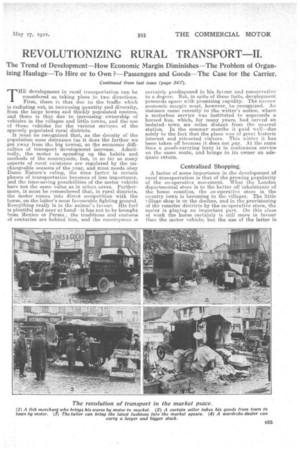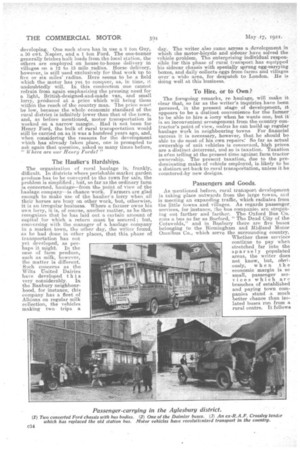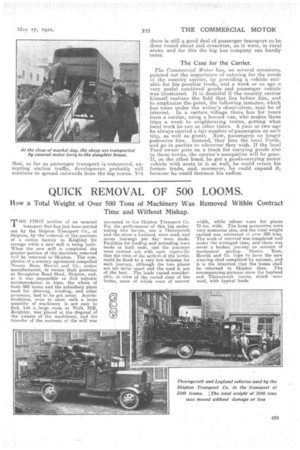REVOLUTIONIZING RURAL TRANSPORT II.
Page 9

Page 10

Page 11

If you've noticed an error in this article please click here to report it so we can fix it.
The Trend of Development—How Economic Margin Diminishes—The Problem of Organizing Haulage—To Hire or to Own ?—Passengers and Goods—The Case for the Carrier.
Continued from last issue (page 367).
THE development in rural transportation can be considered as taking place in two directions. First, there is that due to the traffic which is radiating out, in increasing quantity and diversity, from the large towns and thickly populated centres, and there is that due to increasing: ownership of vehicles in the villagesand little towns, and the use of those vehicles for the various services of the sparsely populated rural districts.
It must be recognized that, as the density of the population zone decreases (as it does the farther we get away from the big towns), so the economic difficulties of transport 'development increase. Admittedly, the motor is speeding up the habits and methods of the countryside, but in so far as many aspects of rural existence are regulated by the unchangeable seasons of the year, and must needs obey Dam.e Nature's ruling, the time factor in certain phases of transportation becomes of less importance, and the time-saving possibilities of the motor vehicle have not the same value as in urban areas. Furthermore, it must be remembered that, in rural districts, the motor cornea into direct competition with the horse, on the latter's most. favourable fighting ground. Everything really is in the animal's favour. His fuel is plentiful and near at hand—it has not to be brought. from Mexico or Persia ; the traditions and customs of centuries are behind him, and the countryman is certainly predisposed in his favour and conservative to a degree. But, in spite of these facts, development proceeds apace with promising rapidity. The narrow economic margin must, however, be recognized. An instance came recently to the writer's notice, where a motorbus service was instituted to supersede a horsed bus, which, for many years, had served an isolated • town six miles distant from the nearest station. In the summer months it paid well—due solely to the fact that the place was of great historic interest and attracted visitors. This winter it has been taken off became it does not pay. At the same time a goods-carrying lorry is in continuous service on the same route, and brings to its owner an adequate return.
Centralized Shopping.
A factor of some importance in the development of rural transportation is that of the growing popularity of the co-operative movement. What the London departmental store is to the better off inhabitants of the home counties, the co-operative store in the country town is becoming to the villager. The little village shop is on the decline, and in the provisioning of the remoter districts by the co-operative store, the motor is playing an important part. On this class of work the horse certainly is still more in favour than the motor vehicle, but the use of the latter is developing. One such store has in use a '2 ton Guy, a 80 cwt. Napier, and a 1 ton Ford. The one-tonner generally fetches bulk loads from the local station, the others are employed on house-to-house. delivery in villages on a 12 to 15 mile radius. Horse delivery, however, is still used exclusively for that work up to five or six miles' radius. Here seems to be a field which the motor has yet to conquer, as, in time, it undoubtedly will. In this connection one cannot refrain from again emphasizing the pressing need for a light, British-designed-and-made van, and small lorry, produced at a price which will bring them within the reach of the country man. The price must be low, because the whole economic standard of the rural district is infinitely lower than that of the town, and, as before mentioned, motor transportation is worked on a narrow margin. Had it not been for Henry Ford, the bulk of rural transportation would still be carried on. as it was a hundredyears ago, and, when considering the reasons for the development which has already taken place, one is prompted to ask again that question, asked so many times before, " W here are our Henry Fords? "
The Haulier's Hardships.
The organization of rural haulage is, frankly, difficult. In districts where perishable market garden. produce has to be conveyed to the town for sale, the problem is simplified ; but, so far as the ordinary farm is concerned, haulage—from the Point of view of the haulage company—is chance works Farmers are glad enough to make use of the haulier's lorry when all their horses are busy an other work, 'but, otherwise, it is an irregular business. Where a farmer owns his own lorry, it is, of course, another matter, as he then recognizes that he has laid out a. certain amount of capital for which a return must be secured ; but, conversing with the manager of a haulage company in a market town, the other day, the writer found, as he had done in other places, that this, phase of transportation has not yet developed, as perhaps it might. In the case of farm produce, such as milk, however, the matter is different. Such concerns as the Wilts United Dairies have developed this very considerably. In the Banbury neighbourhood, for instance, this company has a fleet of Albions on regular milk collection, the vehicles making two trips a day. The writer also came across a development in which the motor-bicycle and sidecar have solved the vehicle problem. The enterprising individual responsible for this phase of rural transport has equipped his sidecar chassis with specially sprung egg-carrying boxes, and daily collects eggs from farms and villages over a wide area, for despatch to London. He is doing well at this business.
To Hire, or to Own ?
The foregoing remarks, re haulage, will make it clear that, so far as the writer's inquiries have been pursued, in the present stage of development, it appears to be a distinct convenience for the farmer to be able to hire a, lorry when he wants one, but it is an inconvenient arrangement from the country contractor's point of view, unless he can build up regular haulage work in neighbouring towns For financial success it is necessary, however, that he should be able to do most of his own repairs: So far as actual ownership of unit vehicles is concerned, high prices are a distinct deterrent., and so is taxation. Taxation is e'en telling at the present time against farm tractor ownership. The present. taxation, due to the pmdominating make of vehicle employed, is likely to be a distinct setback to rural transportation, unless it be countered by new designs. '
Passengers and Goods.
As mentioned before, rural transport development is taking place outwards from the large towns, aed is meeting an expanding traffic, which ra,diates
the little towns and villages. A9 regards passenger. services, for instance, the bus companies are stretchlug out farther and farther. The Oxford Bus Co. runs a bus as far as Burford, " The Dead City of the Cotswolds," and in Banbury there are five buses belonging to the Birmingham and Midland Motor Omnibus Co., which serve the surrounding country. Whether these services continue to pay when stretched far into the sparsely populated areas, the writer does not know, but, bibvi ously, , when the economic margin is so small, passenger services which are branches of established and paying town companies stand a much better chance than isolated buses run from a rural centre. It follows
that, so far as passenger transport is concerned, excepting station traffic, development probably will continue to spread outwards from the big towns. Yet
there is still a good deal of passenger transport to be done round about and crosswise, as it were, in rural areas, and for this the big bus company can hardly cater.
The Case for the Carrier.
The Commercial Motor has, on several occasions, pointed out the importance of catering for the needs of the country carrier, by providing a vehicle suitable' for his peculiar trade, and a week or so ago very useful combined goods and passenger vehicle was illustrated. It is doubtful if the country carrier himself realizes the field that lies before him, and to emphasize the point, the following instance, which has come under the writer's observation, may be of interest. In a certain 'village there has for 'years been a carrier, using a horsed van, who makes three trips a week to neighbouring towns, getting what local work he can at other times. A year or two ago he always carried a fair number of passengers on each trip, as well as goods. Now, passengers no longer . patronize him. Instead, they hire the local Fords, and go in parties to wherever they wish. If the local Ford owner puts on a truck for carrying goods also to these towns, the carrier's occupation will be gone. If, on the other hand, he got a goods-carrying motor . vehicle with seats in it as well, he could retain his former trade, and, moreover, be could expand it, because he could increase his radius.
































